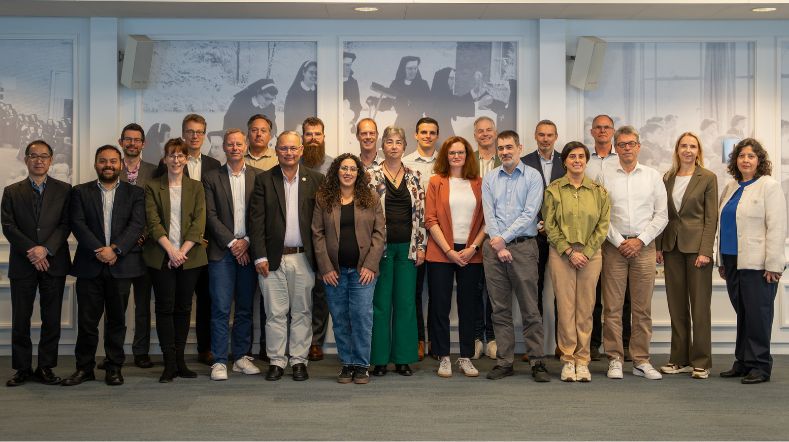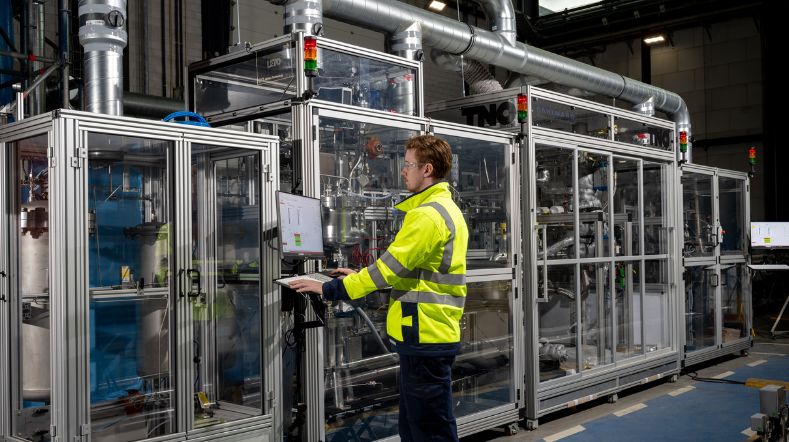Cost-effective producing biomethanol from low-quality waste
Methanol has the potential to play a significant role in the energy transition, provided it is no longer produced from fossil sources but rather from surplus waste streams, including those from agriculture and forestry. The global methanol market is expected to quintuple between now and 2050, reaching 500 million tons per year. Making its production more sustainable will significantly contribute to reducing CO2 emissions in the atmosphere. TNO is working with Norwegian company Equinor, Europe’s largest methanol producer, to explore the role of gasification in this process.
Extensive testing
'In our biofuels lab, we have developed and extensively tested various technologies for the efficient production of biomethanol,' says Berend Vreugdenhil, Senior Researcher in Sustainable Fuels at TNO.
'Gasifying biomass is the core of the technology. Within this process, there are many variations, each with its own advantages and disadvantages in terms of efficiency, costs, and yields. In our lab, we can produce sustainable fuels such as methanol from biomass through various routes. This could help sectors like road and water transport and aviation, which currently rely on fossil fuels, become more sustainable.'
Taking a major step towards industrial implementation
The gasification technology that TNO has developed to produce biomethanol from waste streams such as agricultural waste and demolition wood is ready in principle. It has been proven to work in the lab, and businesses could start working with it. However, the leap from the lab to profitable production is still significant. That’s why TNO is pleased to have a reputable partner like Equinor interested in testing this technology in practice.
Gasification technology
Equinor has identified gasification as a crucial route to producing green methanol. The company is exploring various feedstocks, such as woody waste streams. TNO is helping answer key questions, such as: under which conditions should these streams be gasified, what quality does the green gas have, how can it be optimally upgraded to methanol, and what are the technical and financial risks?

'The abundant availability and favourable price of woody waste streams, such as bagasse, make large-scale biomethanol production attractive, which in turn leads to sustainable fuels, plastics, cosmetics, and various market opportunities.'
Great opportunities
Gasifying woody waste streams produces high-quality biofuels. The gas produced during gasification is cleaned and converted into clean synthesis gas via a process called steam methane reforming (SMR). Using TNO technology, this can then be converted into methanol or sustainable aviation fuels (SAF).
Berend continues, ‘With Equinor, we will apply the technology in practice and develop a viable business case. The abundant availability and relatively low cost of woody waste streams such as bagasse make it initially attractive to scale up biomethanol production.’
‘This will enable the production of sustainable fuels, plastics, cosmetics, and much more. There are many markets to tap into, and with the rapidly growing global demand, this presents fantastic opportunities.’
Stategic advantage
Although countries like China are making significant investments in biomethanol production, Europe is still leading technologically, according to Berend. The key now is to turn this technological lead into an economic advantage and become a dominant player in sustainable methanol production. The Chinese government is rapidly building new biomethanol production facilities.
‘Now, we need to prove that we can scale from pilot projects to commercial production. This requires significant investment. Therefore, we want to demonstrate with Equinor that it is profitable to produce biomethanol. By scaling up from the lab to production, we can eliminate any teething issues, minimise risks, and optimise processes. This will ensure that Europe can effectively compete on the global stage.’
Get inspired
Report: Drop-in solutions as an accelerator of biobased chemistry


New routes for sorting and composite separation


HyFINE: Pioneering sustainable routes for specialty and fine chemicals


From lab to market: TNO steps up sustainable plastic recycling with dissolution


Webinar: Biobased plastics in a sustainable future



